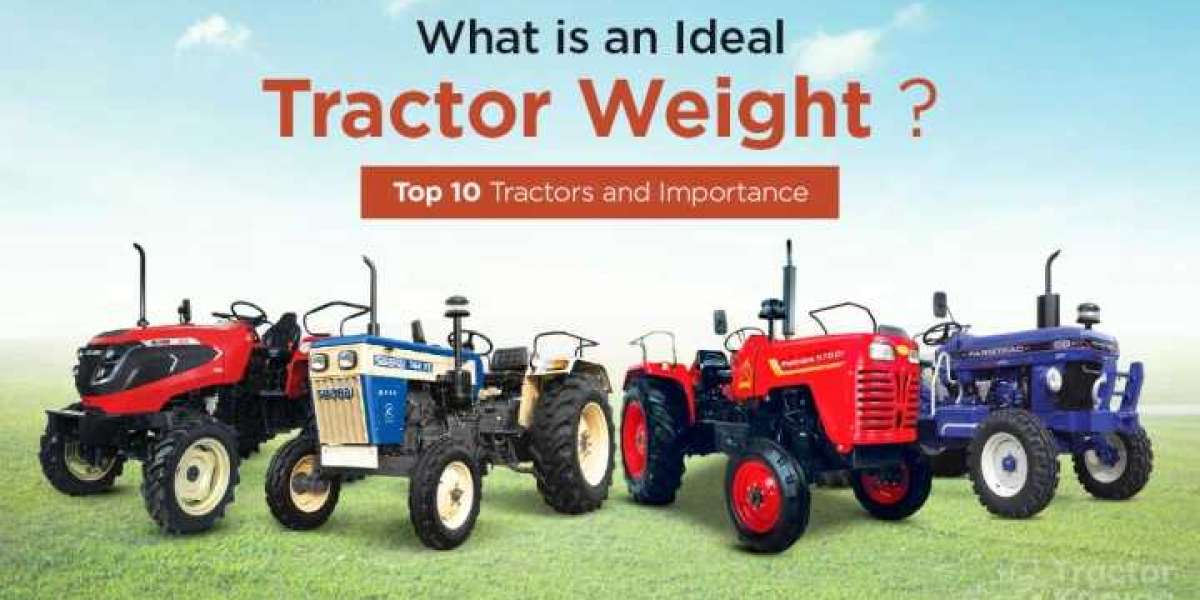When it comes to agricultural machinery, tractors are undoubtedly one of the most critical tools for farmers worldwide. They are versatile workhorses that help with a wide range of tasks, from tilling and ploughing to hauling and planting. While there are various factors to consider when choosing a tractor, one aspect that often plays a significant role in its performance is its weight. In this blog post, we will explore the concept of the ideal tractor weight and its implications for efficiency, stability, and overall productivity.
The Importance of Tractor Weight:
Tractor weight is crucial as it directly influences several aspects of its performance. An appropriately balanced weight distribution can significantly enhance the tractor's ability to perform tasks effectively while ensuring operator safety. Here are a few key reasons why tractor weight in kg matters:
- Traction and Power:
A tractor's weight affects its traction, which is the force that enables the tires to grip the ground and provide propulsion. A heavier tractor generally has better traction, especially in challenging soil or adverse weather conditions. Increased traction allows the tractor to transfer power efficiently from the engine to the ground, ensuring optimal performance during tasks such as ploughing, pulling heavy loads, or operating on uneven terrain.
- Stability and Safety:
Maintaining stability is crucial when operating a tractor, particularly on slopes, rough terrain, or when working with heavy implements. Adequate weight distribution lowers the risk of tipping over, providing a safer working environment for the operator. A well-balanced tractor weight minimises the potential for accidents and maximises stability during operations, contributing to overall productivity and operator confidence.
- Fuel Efficiency:
Efficiency is a key concern for farmers seeking to optimise their operations. Tractor weight plays a role in fuel consumption, as a heavier tractor requires more energy to move. However, there is a balance to be struck since a tractor that is too light might struggle to maintain traction and efficiency, leading to increased fuel consumption. Finding the optimal weight ensures the tractor operates efficiently, minimising fuel costs over the long term.
Factors Influencing Ideal Tractor Weight:
Several factors come into play when determining the ideal weight for a tractor. These considerations may vary depending on the specific tasks and conditions in which the tractor will operate. Some important factors to keep in mind include:
- Soil Conditions:
Different soil types require different tractor weights to maximise performance. For instance, heavier tractors are generally preferred in wet and heavy clay soils, while lighter tractors may be suitable for light and sandy soils. Understanding the soil conditions and their impact on traction is crucial for selecting the appropriate tractor weight.
- Implements and Attachments:
The weight of the implements and attachments being used in conjunction with the tractor should also be factored in. The combined weight of the tractor, implements, and any load being hauled should be within the tractor's recommended limits. Overloading can strain the tractor, leading to decreased efficiency, increased fuel consumption, and potential damage to the machinery.
- Terrain and Slopes:
Operating on uneven or hilly terrain necessitates careful consideration of tractor weight. Steeper slopes require a lower centre of gravity and a well-distributed weight to prevent tipping. Tractors designed for such conditions often incorporate features like ballasting or counterweights to optimise stability.
- Horsepower and Size:
The tractor's horsepower and size should align with the weight to ensure balanced performance. A tractor with insufficient power for its weight may struggle to carry out tasks efficiently, while excessive power in relation to weight can lead to unnecessary fuel consumption and operational costs.
Conclusion:
Determining the ideal tractor weight is a vital consideration when optimising performance, efficiency, and safety in agricultural operations. Striking the right balance between traction, stability, and fuel efficiency is essential for achieving desired results. Farmers should assess factors such as soil conditions, terrain, implements, and horsepower requirements to make an informed decision about the appropriate weight of the tractor in kg. By doing so, they can maximise productivity, reduce fuel consumption, and ensure a safer working environment for themselves and their operators.








